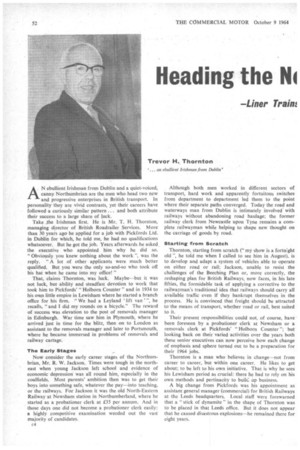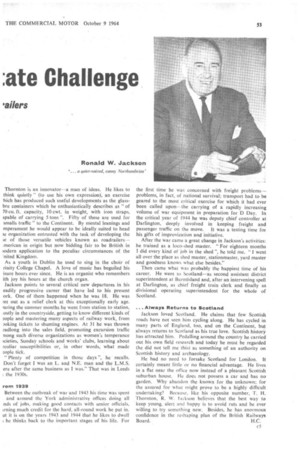Heading the Ni
Page 54

Page 55

If you've noticed an error in this article please click here to report it so we can fix it.
:ate Challenge
—Liner Trak
wilers
A. N ebullient Irishman from Dublin and a quiet-voiced, canny Northumbrian are the men who head two new and progressive enterprises in British transport. In personality they are vivid contrasts, yet their careers have followed a curiously similar pattern ... and both attribute their success to a large share of luck.
Take _the Irishman first. He is Mr. T. H. Thornton, managing director of British Roadrailer Services. More than 30 years ago he applied for a job with Pickfords Ltd. in Dublin for which, he told me, he had no qualifications whatsoever. But he got the job. Years afterwards he asked the executive who appointed him why he did so. "Obviously you knew nothing about the work ", was the reply. "A lot of other applicants were much better qualified. But you were the only so-and-so who took off his hat when he came into my office! "
That, claims Thornton, was luck. Maybe—but it was not luck, but ability and steadfast devotion to work that took him to Pickfords' "Holborn Counter" and in 1934 to his own little empire in Lewisham where he started a branch office for his firm. "We had a Leyland 'lift van ' ", he recalls, "and I did my rounds on a bicycle." The reward of success was elevation to the post of removals manager in Edinburgh. War time saw him in Plymouth, where he arrived just in time for the blitz, then on to London as assistant to the removals manager and later to Portsmouth, where he became immersed in problems of removals and railway cartage.
The Early Stages Now consider the early career stages of the Northumbrian, Mr. R. W. Jackson.. Times were tough in the northeast when young Jackson left school and evidence of economic depression was all round him, especially in the coalfields. Most parents' ambition then was to get their boys into something safe, whatever the pay—into teaching, or the railways. For Jackson it was the old North-Eastern Railway at Newsham station in Northumberland, where he started as a probationer clerk at £35 per annum. And in those days one did not become a probationer clerk easily: a highly competitive examination weeded out the vast majority of candidates.
c4
Although both men worked in different sectors of transport, hard work and apparently fortuitous switches from department to department led them to the point where their separate paths converged. Today the road and waterways man from Dublin is intimately involved' with railways without abandoning road haulage; the former railway clerk from Newcastle upon Tyne remains a complete railwayman while helping to shape new thought on the carriage of goods by road.
Starting from Scratch
Thornton, starting from scratch (" my show is a fortnight old ", he told me when I called to see him in August), is to develop and adapt a system of vehicles able to operate on either road or rail; Jackson, unable to resist the challenges of the Beeching Plan or, more correctly, the reshaping plan for British Railways, now faces, in his late fifties, the formidable task of applying a corrective to the railwayman's traditional idea that railways should carry all available traffic even if they bankrupt themselves in the process. He is convinced that freight should be attracted to the means of transport, whether road or rail, best suited to it.
Their present responsibilities could not, of course, have been foreseen by a probationer clerk at Newsharn or a removals clerk at Pickfords' "Holborn Counter "; but looking back on their varied activities over the years both these senior executives can now perceive how each change of emphasis and sphere turned out to be a preparation for their 1964 jobs.
Thornton is a man who believes in change—not from career to career, but within one career. He likes to get about; to be left to his own initiative. That is why he sees his Lewisham period as crucial: there he had to rely on his own methods and pertinacity to build up business.
A big change from Pickfords was his appointment as assistant general manager (commercial) for British Railways at the Leeds headquarters. Local staff were forewarned that a " stick of dynamite" in the shape of Thornton was to be placed in that Leeds office. But it does not appear that he caused disastrous explosions—he remained there for eight years.
Thornton is an innovator—a man of ideas. He likes to think quietly" (to use his own expression), an exercise .hich has produced such useful developments as the glassbre containers which he enthusiastically describes as "of 70 Cu. ft. capacity, 10 cwt. in weight, with iron straps, ipable of carrying 5 tons ". Fifty of these are used for smalls traffic" to the Continent. By niental leanings and mperament he would appear to be ideally suited to head te organization entrusted with the task of developing the ;e of those versatile vehicles known as roadrailers.merican in origin but now bidding fair to be British in iodern application to the peculiar circumstances of the nited Kingdom.
As a youth in Dublin he used to sing in the choir of rinity College Chapel. A love of music has beguiled his isure hours ever since. He is an organist who remembers ith joy his hours at the church organ.
Jackson points to several critical new departures in his eadily progressive career that have led to his present ork. One of them happened when he was 18. He was tnt out as a relief clerk at this exceptionally early age. luring the summer months he went from station to station, [ostty in the countryside, getting to know different kinds of .tople and mastering many aspects of railway work, from 3oking tickets to shunting engines. At 31 he was thrown tadlong into the sales field, promoting excursion traffic -nong such diverse organizations as women's temperance )cieties, Sunday schools and works' clubs, learning about !culiar susceptibilities or, in other words, what made !ople tick.
"Plenty of competition in those days ", he recalls. Don't forget I was an L. and N.E. man and the L.M.S. ere after the same business as I was." That was in Leeds the 1930s.
rOM 1939
Between the outbreak of war and 1943 his time was spent and around the York administrative offices doing all nds of jobs, making good contacts with senior officials, irning much credit for the hard, all-round work he put in. ut it is on the years 1943 and 1944 that he likes to dwell ; he thinks back to the important stages of his life. For the first time he was concerned with freight problems— problems, in fact, of national survival; transport had to be geared to the most critical exercise for which it had ever been called upon—the carrying of a rapidly increasing volume of war equipment in preparation for D Day. In the critical year of 1944 he was deputy chief controller at Darlington, deeply involved in keeping freight and passenger traffic on the move. It was a testing time for his gifts of improvitation and initiative.
After the war came a great change in Jackson's activities: he trained as a loco-shed master. "For eighteen months I did every kind of job in the shed ", he told me. "I went all over the place as shed master, stationmaster, yard master and goodness knows what else besides."
Then came what was probably the happiest time of his career. He went to Scotland—as second assistant district superintendent at Burntisland and, after an intervening spell at Darlington, as chief freight train clerk and finally as divisional operating superintendent for the whole of Scotland.
...Always Returns to Scotland
Jackson loved Scotland. He claims that few Scottish roads have not seen him cycling along. He has cycled in many parts of England, too, and on the Continent, but always returns to Scotland as his true love. Scottish history has attracted him. Pedalling around the country he carried out his own field research and today he must be regarded (he did not tell me this) as something of an authority on Scottish history and archaeology.
He had no need to forsake Scotland for London. It certainly meant little or no financial advantage. He lives in a fiat near the office now instead of a pleasant Scottish suburban house. He does not possess a car and has no garden. Why abandon the known for the unknown; for the assured for what might prove to be a highly difficult undertaking? Because, like his opposite number, T. H. Thornton, R. W. Jackson believes that the best way to keep young, alert and happy is to avoid ruts and be ever willing to try something new. Besides, he has enormous confidence in the reshaping plan of the British Railways Board.












































































































